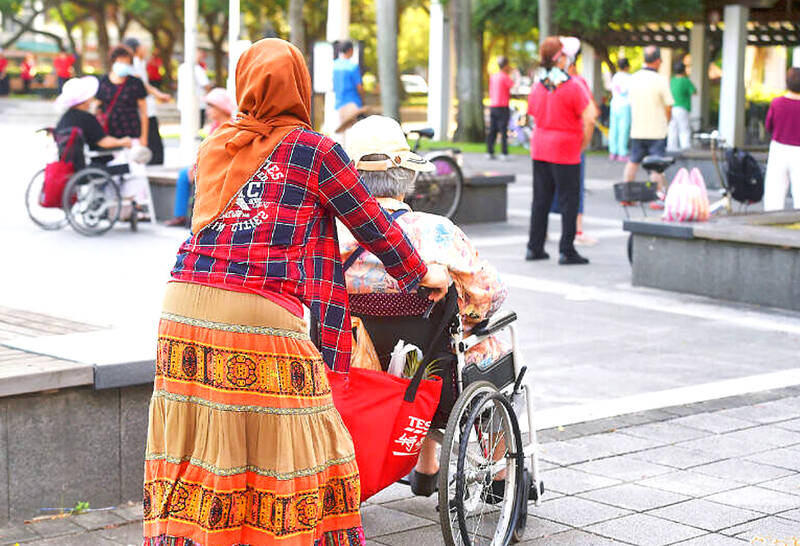A program allowing eligible families to hire migrant caregivers for a minimum of four hours at a time would go into effect by the end of next month, and six selected employers under the program would soon be unveiled, a labor official said on Thursday.
Under the program first announced in May last year, eligible families are those with a member who has a certificate for a physical or mental disability, severe illness or injury.
It also includes households where a family member has been assessed as needing long-term care at levels 2 to 8, or has undergone surgery within the preceding three months.

Photo: Taipei Times
Under current rules, foreign care workers are usually employed on a live-in basis, residing with families who hire them to provide full-time care to someone in that household.
A distinctive feature of the program is that non-governmental organizations, including private foundations and nonprofits, would be the employers of the dispatched caregivers, rather than long-term care institutions, the Ministry of Labor’s Workforce Development Agency (WDA) said.
What sets the pilot program apart from other options is that services can be short-term and provided on short notice to cater to families with urgent needs, WDA senior specialist Hu Hsin-yeh (胡欣野) said.
The selected employers were commissioned because they have documented experience managing Taiwanese caregivers under the long-term care service system and have been in business for at least five years, she said.
However, some of the selected organizations could bring in labor brokers as they might not have the necessary know-how to recruit foreign workers, she added.
That means migrant caregivers could still have monthly “service fees” ranging from NT$1,500 to NT$1,800 deducted from their salaries, he said.
Su Yu-kuo (蘇裕國), head of the WDA’s Cross-border Workforce Management Division, said labor brokers would take care of migrant caregivers’ day-to-day lives, such as managing their dormitories, while recruitment, employment and management of caregivers would be the responsibility of the employers.
Su said that the six selected employers would only be able to commission labor brokers that have been rated “A” by the WDA for five consecutive years, or those that previously posted excellent results and for which evaluations have been waived.
People who hire migrant caregivers through the new program can expect to pay fees of between NT$1,000 and NT$1,250 for four hours, NT$1,200 to NT$2,500 for eight hours and NT$2,600 to NT$3,500 for 24 hours (which must include 10 hours of rest for the worker).
Exact prices would vary from one service provider to another, and a finalized chart outlining prices charged by each provider would be posted on the WDA’s Web site in due course, Su said.

In his National Day Rally speech on Sunday, Singaporean Prime Minister Lawrence Wong (黃循財) quoted the Taiwanese song One Small Umbrella (一支小雨傘) to describe his nation’s situation. Wong’s use of such a song shows Singapore’s familiarity with Taiwan’s culture and is a perfect reflection of exchanges between the two nations, Representative to Singapore Tung Chen-yuan (童振源) said yesterday in a post on Facebook. Wong quoted the song, saying: “As the rain gets heavier, I will take care of you, and you,” in Mandarin, using it as a metaphor for Singaporeans coming together to face challenges. Other Singaporean politicians have also used Taiwanese songs

NORTHERN STRIKE: Taiwanese military personnel have been training ‘in strategic and tactical battle operations’ in Michigan, a former US diplomat said More than 500 Taiwanese troops participated in this year’s Northern Strike military exercise held at Lake Michigan by the US, a Pentagon-run news outlet reported yesterday. The Michigan National Guard-sponsored drill involved 7,500 military personnel from 36 nations and territories around the world, the Stars and Stripes said. This year’s edition of Northern Strike, which concluded on Sunday, simulated a war in the Indo-Pacific region in a departure from its traditional European focus, it said. The change indicated a greater shift in the US armed forces’ attention to a potential conflict in Asia, it added. Citing a briefing by a Michigan National Guard senior

CHIPMAKING INVESTMENT: J.W. Kuo told legislators that Department of Investment Review approval would be needed were Washington to seek a TSMC board seat Minister of Economic Affairs J.W. Kuo (郭智輝) yesterday said he received information about a possible US government investment in Taiwan Semiconductor Manufacturing Co (TSMC, 台積電) and an assessment of the possible effect on the firm requires further discussion. If the US were to invest in TSMC, the plan would need to be reviewed by the Department of Investment Review, Kuo told reporters ahead of a hearing of the legislature’s Economics Committee. Kuo’s remarks came after US Secretary of Commerce Howard Lutnick on Tuesday said that the US government is looking into the federal government taking equity stakes in computer chip manufacturers that

CLAMPING DOWN: At the preliminary stage on Jan. 1 next year, only core personnel of the military, the civil service and public schools would be subject to inspections Regular checks are to be conducted from next year to clamp down on military personnel, civil servants and public-school teachers with Chinese citizenship or Chinese household registration, the Mainland Affairs Council (MAC) said yesterday. Article 9-1 of the Act Governing Relations Between the People of the Taiwan Area and the Mainland Area (臺灣地區與大陸地區人民關係條例) stipulates that Taiwanese who obtain Chinese household registration or a Chinese passport would be deprived of their Taiwanese citizenship and lose their right to work in the military, public service or public schools, it said. To identify and prevent the illegal employment of holders of Chinese ID cards or